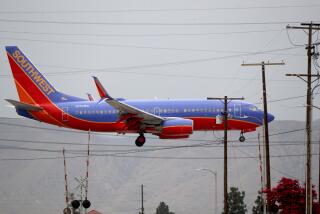U.S., Airlines Face Off Over $700 Million
- Share via
WASHINGTON — When Congress approved a federal takeover of aviation security after the Sept. 11 attacks, the airlines agreed to contribute what they were already spending on security: $1 billion a year.
Now that the Bush administration is trying to collect the money, the airlines say they spent only $300 million a year when they were running the system.
The $700-million gap has prompted a testy confrontation between industry lobbyists and the Transportation Department that could boil over Tuesday at a House hearing on the airlines’ financial troubles.
Transportation Department Inspector General Kenneth Mead is threatening to let his auditors loose on the air-carriers’ books. The industry, meanwhile, accuses the administration of trying to pick its pockets even as several airlines are on the verge of bankruptcy.
One thing is certain: At more than $6 billion this year alone, the cost of a federal aviation security system is greater than anyone expected. A $1-billion airline contribution and the proceeds from a new security fee paid by passengers would not cover even half the costs.
With passengers ponying up as much as $10 per round trip in federal security fees, an advocate for business travelers said the government should not let the airlines wiggle out of their full share.
“I wouldn’t trust the numbers the airlines are putting forth,” said Kevin Mitchell, chairman of the Business Travel Coalition. “They are trying to squeeze every single nickel they can from their customers and shift every expense they possibly can to the government.”
The betting in Congress is that the industry will get at least some relief. “At the end of the day, why not pick a number in between?” said a senior congressional aide. “I don’t think either side wants to fight an accounting war. Either the industry and the department will reach a compromise, or Congress will solve it for them.”
As the airlines plead with Congress for forbearance, they must overcome a potential problem: a paper trail.
A few weeks before the terrorist attacks last year on New York City and the Pentagon, the Air Transport Assn. wrote to congressional investigators at the General Accounting Office to outline the extent of the industry’s spending on security. The lobbying group--the voice of the industry in Washington--estimated annual security costs of $1 billion, including specific items such as $462 million for security screening personnel and $50 million for technology.
Immediately after the attacks, industry officials again cited the $1-billion figure in congressional testimony.
But this summer, the same airline group filed papers with the Transportation Security Administration certifying that the industry only spent $300 million.
“This large difference is of concern to us,” Mead wrote the Air Transport Assn. on Sept. 13. “We believe it is in the best interest of both the taxpayers and the airline industry that this disparity be resolved and the accounting methods supporting these varying estimates be explained.”
Mead added: “The airlines’ independent accounting firms should be prepared to document these amounts.... We plan to review the audit work papers.”
Carol Hallett, head of the airline lobbying group, took umbrage at the suggestion that the airlines had fudged the numbers. “I am troubled at the various conclusions you appear to have drawn,” she wrote Mead in a Sept. 18 letter.
The $700-million discrepancy arose because of a mix of legitimate factors, she said. These included accounting problems that made it difficult to precisely determine what the airlines were paying and questions about the specifics of what Congress intended when it required them to keep contributing.
“Given the absence of solid data, the lack of precision in defining terms ... and lingering confusion over what, if anything, is the correct figure, I am hard pressed to understand your apparent belief that some figures are supportable and others are not,” Hallett wrote the inspector general.
At least one attempt to break the impasse by bargaining has failed. When the Transportation Department suggested $750 million, the airlines came back with a $500-million counteroffer. They got no takers.
“At this point, we do not see the basis for viewing the $500 million as credible nor supportable,” said Mead, adding that $500 million is “half the amount represented [last year] in congressional testimony, yet ironically, it is about $200 million more than the amount the air carriers reported in their certified cost submissions.”
The dispute has taken on added significance because the airlines continue to pile up huge losses. Last year, they lost a record $7.7 billion, even after receiving about $4 billion from a government bailout. Although Southwest Airlines Co. and a few other carriers continue to be profitable, the industry expects to post a $6-billion loss this year.
More to Read
Inside the business of entertainment
The Wide Shot brings you news, analysis and insights on everything from streaming wars to production — and what it all means for the future.
You may occasionally receive promotional content from the Los Angeles Times.










